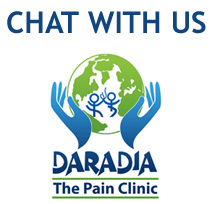One Year Fellowship

Fellowship in Pain Management
Types of one year fellowship programs:
- There are 2 seats for a fully residential fellowship program (non-stipendary). For details, contact us at +919163730004.
- There are 6 seats available every quarter (Jan, April, July, and Oct) for the one-year fellowship. This is a hybrid program that includes 3 months of offline and 9 months of online coursework.
Details of one years fellowship with contacts program
Daradia: The Pain Clinic was started in 2008 with an aim of spreading awareness about pain management and bringing an end to the suffering of chronic pain patients. A few years later, we expanded into a bigger hospital with all the eminent facilities and the latest technology for the treatment of all chronic pain conditions. We received the “Excellence in Pain Practice” award from the World Institute of Pain in 2010 for pain practice, research in pain, and training of doctors in pain management across the world. We also received the “Best Pain Clinic” award from the Indian Society for Study of Pain in 2011.
Since 2008, we are conducting various short courses in pain management, fellowship programs, online training programs, tailored courses, workshops on ultrasound-guided procedures, and advanced procedures such as radiofrequency ablation, intrathecal pumps, etc. More than 7000 physicians across the world have completed some of our courses.
Faculty:
All the faculty members of Daradia have vast experience in teaching, research, and publications. They have vast experience in teaching in both online and offline courses. They have numerous publications in peer-reviewed journals, written various book chapters, and authored books on pain management.
- Gautam Das
- Shirish Amatya
- Anamul Haque Milton
- Sushpa Das
- Smruti Rekha Hota
Highlights of the one-year fellowship:
- We invite 6 candidates in each batch.
- Batches starts from 1st Jan, 1st of April, 1st July and 1st Oct. One can apply for any of these batches.
- Each batch will complete online basic classes and demonstration for basics in the first 3 months; then, they must come to Daradia or another affiliated center for 3 months, according to their convenience, to learn the skills. Each participant can stay for multiple of 1 month in each visit starting from 1st day of the month. Based on the merit list at the entry exam, candidates can choose Daradia-Kolkata or any other affiliated centers at Pune, Sambalpur, Guwahati, Nagpur, Ahmedabad, Bhubaneswar, Jaipur, Kathmandu, Faridpur and Trichy. Before joining centers for their clinical attachment, they must visit Daradia-Kolkata for 2 weeks of the offline program.
- Fellows can attend four online basic courses, one online fellowship in musculoskeletal pain management, and one online advanced course in pain management only.
- Each participant can attend one offline hands-on workshop organized by Daradia Pain Clinic with other participants, for which registration fees will be waived. He/she can also attend any other Daradia Pain Clinic-organized workshops at 50% discounts. However, they must pay for CME certificates if they wish to have them.
- During their stay at Daradia they will attend OPD, assist in interventional procedures, and perform interventional procedures under supervision.
- Every Saturday during their stay at Daradia, they must do one of the following activities: seminars (online/offline), a hands-on workshop on mannequins under C-arm, or ultrasound scanning of volunteers.
- Each participant must appear for the offline final exam after the completion of one year of tenure.
Eligibility for admission:
The candidate must have a post-graduate degree, diploma, or DNB in anesthesia, PMR, orthopaedics, radiology, neurology, neurosurgery, or rheumatology.
Admission process:
Interested candidates can apply for a one-year fellowship through an online application form duly filled in along with a document of payment of online entrance examination fees of 900 INR. The date of the entrance exam will be announced on the website at regular intervals. Six top participants will be selected based on the examination results.
Syllabus for the entrance examination: pain pathway, pharmacotherapy of pain, and definitions/ nomenclatures of different types of pain (IASP).
Contact +91916373004 by WhatsApp for admission and entrance exams.
The next exam date for the July 2024 batch is 7 PM on 1st June 2024
Course fee:
For Indian candidates- 1,80,000 INR inclusive of all taxes
For International candidates: 4300 USD inclusive of all taxes
Eligibility to appear for the final exam at the end of 1 year:
- Completion of 3 months offline program
- Submission of the countersigned logbook
- Acceptance letter of the submission of one article in a peer-reviewed journal.
- All candidates must submit an article in the first 6 months of their fellowship.
- Payment of examination fees of 10,000 INR
Syllabus of one-year fellowship program:
Topics for first 3months (Online Mode only):
- Clinical Methods in Pain Medicine: History taking in pain medicine, evaluation of headache, neck pain, shoulder pain, elbow pain, wrist and hand pain, low back pain, hip pain, knee pain, leg pain, ankle and foot pain, widespread pain, visceral pain and presentation of various arthropathies
- Non pharmacological management of pain: Physical therapies and rehabilitation
- Psychological evaluation and therapy: Various scales to measure depression. Comprehensive psychological assessment Treatment options Individual, group and family psychotherapy Cognitive-behavioural therapies Biofeedback and relaxation techniques
- Pharmacotherapy: Local anaesthetics, Dextrose, Steroid, Opioids, NSAIDs and COX2 inhibitors Adjuvants/Co-analgesics: antidepressants, anticonvulsants, other adjuvants, Dye used in interventions
- Basics of USG: Physics, Machine, Knobology, Tissue Characterization
- C-arm guided procedures: Radiation safety, Fluro-anantomy of spine, MRI of lumbar spine and X-Ray of various joints and spine
Topics to be covered in the next 3months (Offline/Online)
- C-arm guided interventions of lumbosacral spine: transforaminal/ interlaminar epidurals, facet joint medial branch block/discography/sacroiliac joint/caudal/ganglion impar
- USG-Guided Interventions: Shoulder, Elbow, Wrist and Hand, Hip, Knee, Ankle and Foot, Lumbar Spine, Sacroiliac joint, Caudal epidural
- Regional pain syndromes: Myofascial Pain Syndrome, Lower Back Pain
- Neuropathic pain conditions: CRPS, post-stroke pain, phantom limb pain, post-herpetic neuralgia, painful diabetic neuropathy, scar neuralgia (post-surgical pain)
- Rheumatological conditions: Rheumatoid arthritis, spondyloarthropathies, crystal arthropathy, SLE, DMRDS and Biologics
Topics to be covered in the last 6months (Offline/Online)
- Regional pain syndromes: Headache, facial pain syndrome, neck pain, thoracic and abdominal pain, Pelvic and perineal pain
- Specific types of painful conditions: Trigeminal neuralgia, Cancer Pain, including issues of death and dying, palliative care and hospice, Pain of unknown aetiology, Pain in children and elderly
- Interventional Pain Management (USG/ C-arm guided procedures, hybrid procedures)
Interventions & nerve blocks in head and neck, Interventions & nerve blocks in the cervical and thoracic region, Advanced interventional procedures– endoscopic discectomy, spinal cord stimulators, intrathecal implants, vertebroplasty.
- Neurolysis- Radiofrequency and cryoneurolysis, neurolytic procedures for cancer pain, neurolytic procedures for knee pain, hip pain, shoulder pain.
- Regeneration therapies– USG guided regeneration therapies, PRP, Dextrose prolotherapy
General rule/instructions that are compulsory before the final exam:
- Maintaining a log book is mandatory and must be submitted before the final exam.
- Before the exam, the candidate must submit proof of one published article or an article manuscript acceptance letter from a peer-reviewed journal. (An Abstract or poster presentation in an international pain conference is considered equivalent.)
- Details of participation in academic programs like seminars, symposiums, clinical meetings, webinars, conferences, and workshops.
- The fellows must take lectures for junior batches.
- The fellows must furnish documents that they have observed and/or assisted the interventional pain management procedures.
- The candidate must perform at least 50 interventions during his/her academic year.
- Candidate must fill logbook properly.
- The consultant must endorse entries in the logbook.
- On the completion of the course by the candidate, they must deposit logbooks in the department for future reference.
Recommended books to read:
- Basic of Pain Management 3e by Gautam Das by CBS Publishers
- Clinical Methods in Pain Medicine 2e by Gautam Das by CBS Publishers
- Musculoskeletal Ultrasound in Pain Medicine by Gautam Das by CBS Publishers
- Interventional Pain: A Step-by-Step Guide for the FIPP Exam by Agnes R. Stogicza, Andre M. Mansano, et al.
- Ultrasound for Interventional Pain Management: An Illustrated Procedural Guide by Anuj Bhatia, Philip Peng, et al.
- Practical Management of Pain by P. Prithvi Raj


